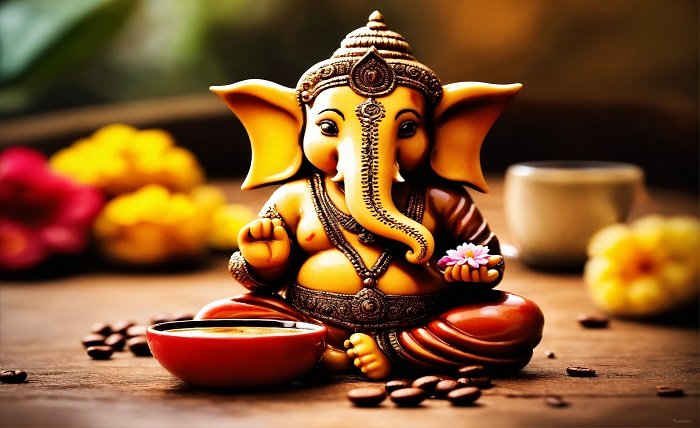Ganesh Chalisa: The Sacred Hymn of Lord Ganesha for Devotion and Prosperity

The Ganesh Chalisa is one of the most powerful and devotional hymns dedicated to Lord Ganesha, the remover of obstacles and the symbol of wisdom and prosperity. Composed in forty verses, the Ganesh Chalisa holds a special place in Hindu devotional practices, as it praises the glory, qualities, and blessings of Lord Ganesha. Reciting the Ganesh Chalisa daily is believed to bring inner peace, spiritual strength, and material success. This sacred hymn is not only a form of prayer but also a way to connect deeply with divine energy.
History and Origin of Ganesh Chalisa
The Ganesh Chalisa has its roots in traditional Hindu devotional literature, written in the Awadhi and Hindi languages to make it accessible to the masses. Unlike long scriptures, the Ganesh Chalisa was composed in forty verses to make it easy to recite and remember. The verses describe the greatness of Lord Ganesha, his role in Hindu mythology, and his power to remove difficulties from the lives of devotees. The Ganesh Chalisa evolved as part of the Bhakti movement, emphasizing devotion over rituals and connecting people directly with the divine.
Structure and Meaning of Ganesh Chalisa
The Ganesh Chalisa consists of a chaupai (four-line verse) format, which is simple, rhythmic, and melodious. Each verse of the Ganesh Chalisa glorifies the virtues, strength, and compassion of Lord Ganesha. The opening verses invoke his blessings, the middle verses narrate his divine attributes, and the final verses seek his protection and grace. By understanding the structure of the Ganesh Chalisa, devotees gain insight into the symbolic meanings of Ganesha’s elephant head, his trunk, and his role as Vighnaharta (remover of obstacles). The hymn is a complete spiritual guide in poetic form.
Benefits of Reciting Ganesh Chalisa
Regular recitation of the Ganesh Chalisa has immense spiritual and practical benefits. Devotees believe that chanting the Ganesh Chalisa helps remove obstacles in career, studies, marriage, and business. It is also said to bring good fortune, peace of mind, and protection from negative energies. Students recite the Ganesh Chalisa before exams to seek clarity and wisdom, while professionals chant it to overcome challenges in their work life. On a spiritual level, the Ganesh Chalisa cultivates inner devotion, strengthens concentration, and fosters a positive mindset aligned with divine energy.
Ganesh Chalisa During Festivals and Rituals
The Ganesh Chalisa holds special significance during Ganesh Chaturthi, a grand festival dedicated to Lord Ganesha. During the ten-day celebration, devotees chant the Ganesh Chalisa daily to invoke divine blessings and celebrate the presence of the deity in their homes. The Ganesh Chalisa is also recited during important life events like weddings, new ventures, or housewarming ceremonies to ensure prosperity and remove obstacles. Priests often include the Ganesh Chalisa in puja rituals, highlighting its importance as a universal hymn for peace, success, and devotion.
Lyrics and Verses of Ganesh Chalisa
The Ganesh Chalisa begins with a mangal (auspicious prayer), followed by verses praising Lord Ganesha’s attributes, his compassion, and his divine stories. Each verse of the Ganesh Chalisa reflects a specific quality, such as his wisdom, bravery, and kindness. The concluding verses of the Ganesh Chalisa are prayers seeking forgiveness for mistakes and blessings for a happy life. Many versions of the Ganesh Chalisa are sung with devotional music, making it easier for devotees to remember and recite. Understanding the verses enhances the devotional experience.
Spiritual and Psychological Impact of Ganesh Chalisa
Beyond its religious value, the Ganesh Chalisa has a calming and healing effect on the mind. The rhythmic chanting of the Ganesh Chalisa creates vibrations that reduce stress and bring peace. Devotees feel motivated and more focused after reciting the Ganesh Chalisa, as it instills faith and courage. Psychologists often acknowledge that mantras like the Ganesh Chalisa help reduce anxiety and strengthen mental well-being. The practice of chanting the Ganesh Chalisa thus combines spiritual devotion with practical psychological benefits for a balanced life.
How to Incorporate Ganesh Chalisa into Daily Life
Devotees can include the Ganesh Chalisa in their daily routine to experience continuous divine blessings. It is recommended to recite the Ganesh Chalisa early in the morning or before starting important tasks. Many families recite the Ganesh Chalisa together during evening prayers, fostering unity and devotion in the household. The Ganesh Chalisa can also be chanted before meditation, as its verses prepare the mind for concentration. Carrying a pocket book or downloading audio versions of the Ganesh Chalisa makes it easy to stay connected to this sacred hymn anywhere.
Conclusion
The Ganesh Chalisa is more than just a devotional hymn—it is a spiritual tool that brings peace, success, and protection into the lives of devotees. With its simple structure, deep meaning, and universal appeal, the Ganesh Chalisa continues to be a beloved prayer across generations. By reciting the Ganesh Chalisa with faith and devotion, one can remove obstacles, invite prosperity, and achieve inner strength. Truly, the Ganesh Chalisa remains a timeless guide for leading a life of devotion, wisdom, and positivity.
FAQs
1. What is the Ganesh Chalisa?
The Ganesh Chalisa is a forty-verse devotional hymn dedicated to Lord Ganesha, praising his virtues and seeking his blessings.
2. Who wrote the Ganesh Chalisa?
The exact authorship of the Ganesh Chalisa is not clearly documented, but it is part of traditional Hindu devotional literature.
3. When should I recite the Ganesh Chalisa?
The Ganesh Chalisa can be recited daily, especially in the morning or before important tasks, and during festivals like Ganesh Chaturthi.
4. What are the benefits of Ganesh Chalisa?
Reciting the Ganesh Chalisa removes obstacles, brings peace, enhances concentration, and ensures divine blessings for success and prosperity.
5. Can I recite the Ganesh Chalisa without knowing Sanskrit?
Yes, the Ganesh Chalisa is often written in Hindi or Awadhi, making it easy for anyone to understand and recite with devotion.





